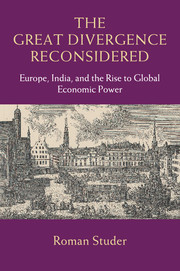2 - Determinants of market integration
Published online by Cambridge University Press: 05 February 2015
Summary
The present investigation deals with two very large geographical entities – the European continent and the Indian subcontinent. When analyzing and comparing these large entities as part of the “big picture” in Part I, many differences within and between them will be ignored. However, this macro picture is important, as it draws the broad lines of historical development. Even though the two territories were, for most of the period studied, neither politically nor economically entirely unified, their various parts nevertheless maintained close economic and political ties and shared countless historical experiences and cultural and social characteristics, which defined them as entities separate from other territories. Notwithstanding the many regional disparities, there was a “European” path of economic development, and also an Indian one, as the unifying factors were stronger than the dividing ones. However, the macro picture should, and will, be complemented in Part II with analyses that try to differentiate regional disparities and narrow down the geographical focus.
As with the geographical extent, the process under study – market integration or economic integration more generally – is equally multifaceted. Undoubtedly, such a far-reaching process is embedded in the general course of historical development on all levels. The expansion from a regional economy to a global market – arguably achieved in the advanced part of the world in the period from 1700 to 1900 – profoundly changed most aspects of life. Therefore, only a history of both regions that encompasses a wide range of economic, social, political, geographical, and cultural aspects would be able to explain such a far-reaching historical development. But this is neither feasible nor necessary here, as the main contribution of this work lies elsewhere, namely in the quantitative investigation of the levels and trajectories of economic integration in India and Europe. Nevertheless, this chapter attempts to discuss briefly what are believed to be the most important natural and historical determinants of market integration. By doing so, it simultaneously provides a literature survey of the central writings on these topics.
- Type
- Chapter
- Information
- The Great Divergence ReconsideredEurope, India, and the Rise to Global Economic Power, pp. 25 - 69Publisher: Cambridge University PressPrint publication year: 2015



